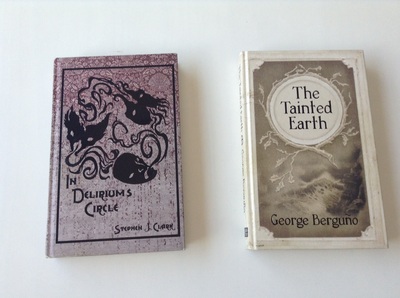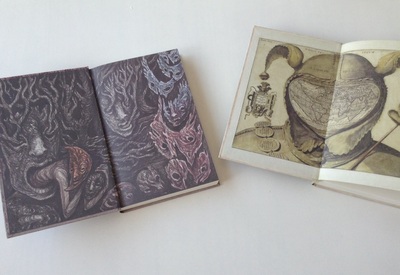|
The Egaeus Press creator, writer, editor, Mark Beech would first be remembered as the publisher of the cult small literary zine Psychotrope at 1990s. Nowadays, with Egaeus Press, his vision is "moved by the concept of the world as a haunted house, and by the paradox of all life’s darkest fears and most ecstatic wonders being essentially one and the same.” (from the Egaeus Press website).
Although Egaeus Press is a young publish house, the first three book releases demonstrate breath and reasonably ambitious project. Could you tell a little more about the history of Egaeus? Perhaps the biggest considerations when starting Egaeus Press was wanting to stand out from other publishers. I wanted to hit the indie publishing scene fully formed and to make Egaeus Press books look and feel different from anything else that was out there - which was a little over-ambitious to be honest. From a business and design point of view, there are things I could have done better in those first months; and things I couldn't possibly have known without trying. But the books came out pretty well all in all, and I think I managed to stand out. I was of course very lucky to have Reggie Oliver, Stephen J. Clark and George Berguno for those first books. My own (very rare) writings had appeared in (quite obscure) anthologies alongside all three – although we had never communicated – which I think gave me the courage to get in touch with them, though I'm not sure it was much of a factor in their acceptance of my proposal. I explained what I hoped to achieve with the look and feel of Egaeus Press books, and I'm very pleased they trusted me. One of the most notable features of the Egaeus Press editions is it's the book design: illustrations, art, typography and book form mixed up in a rare harmony in a incredible way that the hardcover books seem lightweight and portable as paperbacks. What are the references for this exquisite graphic work? Some publisher in past as a influence? The only unifying factor in the design of Egaeus Press books is the impression of age; not necessarily of great antiquity, but of some other time. This isn't done through pastiche – and I don't think any Egaeus publication could be mistaken for an older book – but by using unfashionable design conventions and very simple things like header pagination and endpapers. I hope it works, in some intangible way on the reader – a hairs-on-the-back-of-the-neck thing. I'm not sure I can name many publishers specifically as influential in the design of the book. I love old Edwardian children's novels and annuals because they are so over-designed, gaudy even. But evocative. Quality adult books of the era are often more austere, though there are some nice art nouveaux designs. No doubt these sort of books were not taken too seriously – likewise Victorian pulps are beautifully evocative. But just the dirt, the fade, and the library stamps in old books unintentionally add something evocative for me. With the design of Egaeus Press books I attempt to capture what elements of these sorts of designs and glitches work in a spine-tingling sense. Some publishers have a unifying vision or even a principle, a theoretical formulation that serves as some kind of guideline. There would be something similar in the case of Egaeus Press? It would be possible to define your editorial house with an idea, a word, a speculative notion? "Morbid and Fantastical Works" as the Egaeus Press subtitle says pretty much covers it. I don't like to spend too much time saying what I do and don't like to publish, because I too often these days come across writing which surprises me by defying its own limitations. There is a list of things on the website which it says Egaeus Press likes... including stuff like 'Clocks and clockwork', 'Crumbling ancestral homes' and 'The folk tales of Europe', but I was careful not to include what I don't like. As long as something 'feels' like it belongs to the kind of world Egaeus Press inhabits, then that's probably enough. Were there plans to expand the Egaeus Press catalog to other traditions of the fantastic: perhaps old authors or translations? If there is something, what would the authors that could be translated or published? The hardest thing is finding the time to expand Egaeus Press into areas I'd like to explore. At present I have enough going on to take me into the latter part of 2014, and ideas for projects beyond that. Another thing is that I like to be able to run ideas for the design of the books past the writers and make sure they have some input. It's become a very important part of what I'm doing. The books should have a little of the writer in them. To publish / republish / translate older books, perhaps by dead writers would require a different approach to the design. It's do-able, but it'd take some serious thought. This interview was conducted with the support of FAPESP, as part of my post-doctoral research.
1 Comment
Mitzi Humphrey
1/25/2021 09:11:28 am
The best in this special niche of publishing.
Reply
Leave a Reply. |
Alcebiades DinizArcana Bibliotheca Archives
January 2021
Categories
All
|


 RSS Feed
RSS Feed
